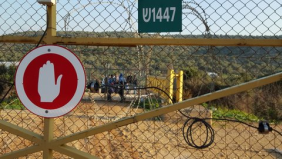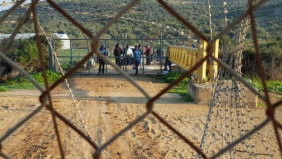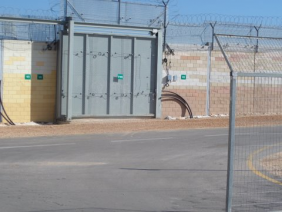Habla
The situation is getting worse, gates are being closed; passes for vehicles are being taken away. Walking is exhausting and frustrating (5-8 kilometers from the agricultural lands.
are being closed; passes for vehicles are being taken away. Walking is exhausting and frustrating (5-8 kilometers from the agricultural lands.
Habla, gate 1393
The gate was opened on time at 6 AM. Groups of 5 Palestinians quickly go through. Anyone arriving gets through the roadblock. “When might we go to work in the morning with no fences, road blocks, and no soldiers?” asks one of them? “We have had enough seeing this every morning – I actually pity them too,” he says, pointing to the soldiers. Right sir you’re so right, we have to put an end to it!
6:35– A wagon pulled by a donkey, and after that another wagon pulled by a horse, enter the gate. They get through and they all greet us with “Good morning”.
Beit Amin: 1447 (Abu Salman)
Although the time able sent from the the command center to Tammy a few days ago said that the pedestrians can pass through from 07:45 to 08:00 and vehicles from 08:00 to 08:15, vehicle passes have been confiscated. We arrived before 08:00, and saw beyond the fence a large number of Palestinians, waiting. Everyday 60 people pass through the gate, and even more on Sunday.

Life behind the gates. Fences, barbed wire …..

Donkey and cart
07:45– the soldiers arrive on time. At first, they have to move us out, the three women. A soldier talks to us politely – “you shouldn’t be here, this is a “sterile site.” After a short argument, we realize that we are holding up the opening of the gate and we have come to help, and not to disturb.” We go back and the gate is opened.
site.” After a short argument, we realize that we are holding up the opening of the gate and we have come to help, and not to disturb.” We go back and the gate is opened.
From the distance shouting is heard, it’s hard to understand what is being said. I heard the voice of a female soldier shouting, “go back”. When dealing with Palestinians, politeness disappers. One by one the Palestinians go to the checkpoint for registration and inspection. Afterwards, they start a hike on foot, uphill, for 5 km. They have to walk everyday, in both directions. Older people and children stay at home. The instruction to disallow vehicles was given only two weeks ago. Of course, no explanation. If possible, why not be crude? Only bicycles can get through, but no-one has a bicycle. R. tells us that he has an orchard and he also grows Za’atar on 200 dunams. He keeps a guard for his agricultural equipment and produce. The guard is an Israeli Arab from Kfar Quasam. R. has studied law in Nablus, is married to a lawyer and has 7 children. Two boys, aged 15 -16, go through with him and he tells us that they are not in school because they must help with the family’s income. He himself supports two needy families and pays a sum of money to sustain them every month.
They say that the military team opens the Jaloud gate at 05:45 between Isbat Salman and Habla. The Habla gate is opened and finally the military team gets to Beit Amin to open the gate. (According to the information we have, the Jaloud gate is totally closed. This gate opens too late, they go through at 08:00 and start trekking the 5 km, arriving at their fields too late to begin a day’s work, and are also exhausted from the walk.
Their demand is to open the Grey Gate 1473 opposite the entrance to Oranit (Derech Haim Laundau). This gate was opened a few months ago, in our observation a few months ago we saw Palestinians go through with their tractors. For some reason, the army decided to close it. (See photo of closed gate). ”They closed this gate on purpose – they aim to tire us out, to make us desperate so that we stop cultivating our land and then Israel would have a reason to confiscate it.” “How can we live like this,” one asks. “If something happens at home, with the family, if my child is sick, I cannot go home, I must wait for hours for the reopening of the gate. This is life?” “No wonder the fences were cut, what other choice is there?”

Another adds, “I cannot move the merchandise. I cannot carry it on my back. I cannot grow Za’atar, everything remains in the field. That’s what the Israelis want, for us to have a hard time”
A. approaches us – he lives in Azzun-Atma, and suffers from the closing of the gate there. His field is near to Etz Ephriam, Elkana and Shaari Tikva. Most Palestinians pass through the Ayal Gate. The transportation there is very expensive - a big chunk of their income is wasted on transportation from home to the gate and back. A. rides a bicycle, but many don’t go to their fields to cultivate them – they don’t have the strength to walk all that distance. A day’s work must start at 6 A.M and not at 9. “What, are we doctors? We are workers,” Another one adds “Let us make a living”. “Anyone who has an income does not make trouble, ” says another.
